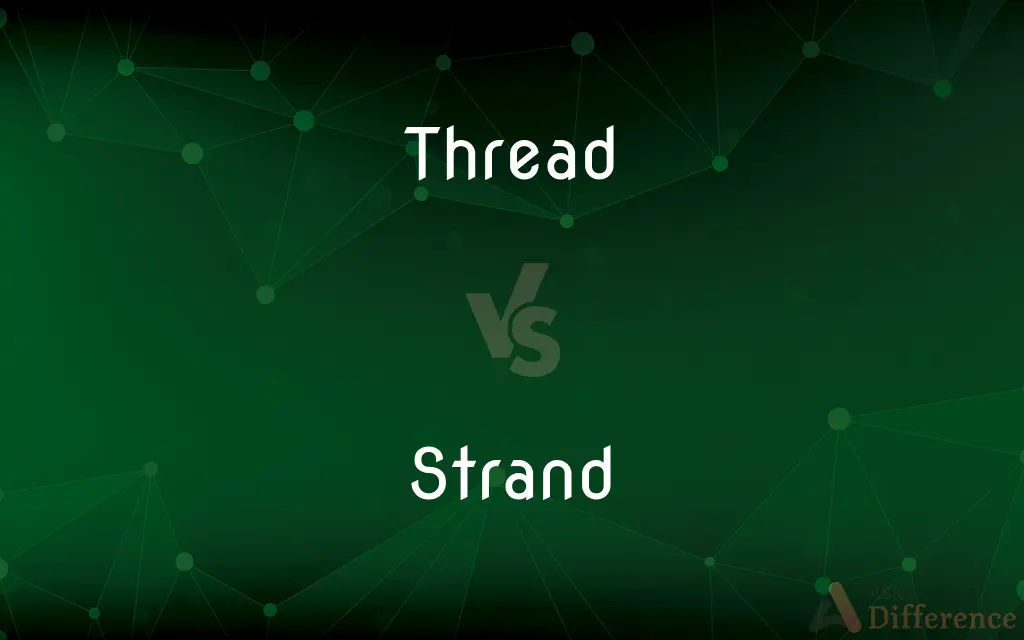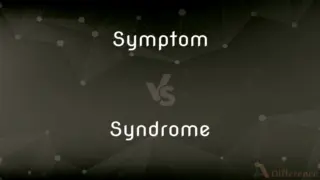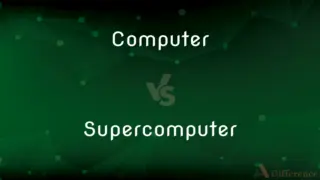Thread vs. Strand — What's the Difference?
By Tayyaba Rehman & Maham Liaqat — Updated on March 28, 2024
Thread refers to a fine cord of twisted fibers used in sewing, while a strand can mean one of the fibers twisted together to make thread, yarn, or rope. Both play roles in creating stronger materials but serve different functions.

Difference Between Thread and Strand
Table of Contents
ADVERTISEMENT
Key Differences
Thread is a fundamental component in the world of textiles, known for its role in sewing and weaving to join materials together. It's characterized by its fine structure, designed to be strong yet thin enough to pass through the eye of a needle. On the other hand, a strand refers to a single thin piece of something, like fiber or wire, that when twisted with others, forms a thread, yarn, or rope. This distinction highlights thread's role as a product of strands coming together, while a strand stands as a singular entity contributing to the creation of a larger item.
Thread's significance is further emphasized in its application in various crafts and industries, from clothing construction to embroidery. It is selected based on its material, strength, and color to suit specific projects. Whereas a strand, in its simplicity, serves as a building block for more complex structures like ropes and cables, where its strength is multiplied when twisted with others.
The versatility of thread extends beyond textiles, finding its place in surgical sutures and even in technological applications like conductive thread. Strand, in contrast, sees its versatility in a different light, being integral to the strength and flexibility of items like bridges, electrical cables, and even in the natural world, such as strands of DNA.
In the manufacturing process, the production of thread involves the twisting or spinning of multiple strands together to achieve the desired thickness and strength. This process highlights the collaborative strength of strands. Strand, while it can be used individually, gains its true potential when combined with others to form a cohesive and stronger whole.
Understanding the relationship between thread and strand is crucial in various fields, from textiles to construction. Thread, as a composite of strands, showcases the collaborative strength and intricate design possible when simple elements come together. Meanwhile, a strand, in its individuality, reminds us of the importance of the foundational components that create complex and durable structures.
ADVERTISEMENT
Comparison Chart
Definition
A fine cord of twisted fibers used in sewing or weaving.
A single thin piece of something, like fiber, hair, or wire.
Composition
Made by twisting or spinning strands together.
Can be a single fiber or wire, or part of a thread or rope.
Function
Used to join materials together in textiles and other crafts.
Serves as a building block for threads, yarns, or ropes.
Applications
In sewing, embroidery, and as conductive materials in tech.
In making ropes, cables, and in the natural world (e.g., DNA).
Strength & Usage
Selected for material, strength, and color; integral in textiles.
Integral to the strength and flexibility of larger structures.
Compare with Definitions
Thread
A thin string of cotton, silk, or other material used in sewing.
She threaded her needle with a strong silk thread for the delicate fabric.
Strand
A single length of fibers, wires, or hair.
A strand of hair fell into her eyes as she read.
Thread
A component used in weaving to create fabric.
The loom was set up with a fine thread for weaving a smooth textile.
Strand
A component of a rope or cable.
The rope broke when one of its strands snapped.
Thread
In computing, a sequence of executable instructions.
The software's performance improved after optimizing its threads for multi-core processors.
Strand
In storytelling, an element of the plot.
The movie interweaves several strands of the story into a cohesive narrative.
Thread
Conductive thread used in electronic textiles.
They incorporated conductive thread into the fabric to add touch-sensitive areas.
Strand
In geography, a shore or beach.
They walked along the sandy strand at sunset.
Thread
A metaphorical term to describe a continuous theme.
The thread of hope runs throughout her novel.
Strand
A part of something larger, contributing to its whole.
A single strand of DNA contains many genes.
Thread
Fine cord of a fibrous material, such as cotton or flax, made of two or more filaments twisted together and used in needlework and the weaving of cloth.
Strand
Land, typically a beach, bordering a body of water.
Thread
A piece of such cord.
Strand
A complex of fibers or filaments that have been twisted together to form a cable, rope, thread, or yarn.
Thread
A thin strand, cord, or filament of natural or manufactured material.
Strand
A single filament, such as a fiber or thread, of a woven or braided material.
Thread
Something that suggests the fineness or thinness of such a strand, cord, or filament
A thread of smoke.
Strand
A ropelike length of something
A strand of pearls.
A strand of DNA.
Thread
Something that suggests the continuousness of such a strand, cord, or filament
Lost the thread of his argument.
Strand
A wisp or lock of hair.
Thread
A helical or spiral ridge on a screw, nut, or bolt.
Strand
One of the elements woven together to make an intricate whole, such as the plot of a novel.
Thread
A portion of a program that can run independently of and concurrently with other portions of the program.
Strand
To drive or run (a boat, for example) ashore or aground.
Thread
A set of posts on a newsgroup, composed of an initial post about a topic and all responses to it.
Strand
To cause (a whale or other sea animal) to be unable to swim free from a beach or from shallow water.
Thread
Threads(Slang)Clothes.
Strand
To bring into or leave in a difficult or helpless position
The convoy was stranded in the desert.
Thread
To pass one end of a thread through the eye of (a needle, for example).
Strand
(Baseball) To leave (a base runner) on base at the end of an inning.
Thread
To pass (something) through in the manner of a thread
Thread the wire through the opening.
Strand
(Linguistics) To separate (a grammatical element) from other elements in a construction, either by moving it out of the construction or moving the rest of the construction. In the sentence What are you aiming at, the preposition at has been stranded.
Thread
To pass a tape or film into or through (a device)
Thread a film projector.
Strand
To be driven or run ashore or aground
The boat stranded on the rocks.
Thread
To pass (a tape or film) into or through a device.
Strand
To be stranded, as on a beach. Used of sea animals.
Thread
To connect by running a thread through; string
Thread beads.
Strand
To make or form (a rope, for example) by twisting strands together.
Thread
(Sports) To throw or send (a pass) through a heavily defended area to a teammate.
Strand
To break a strand of (a rope, for example).
Thread
To make one's way cautiously through
Threading dark alleys.
Strand
The shore or beach of the sea or ocean; shore; beach.
Grand Strand
Thread
To make (one's way) cautiously through something.
Strand
The shore or beach of a lake or river.
Thread
To occur here and there throughout; pervade
“More than 90 geologic faults thread the Los Angeles area” (Science News).
Strand
A small brook or rivulet.
Thread
To machine a thread on (a screw, nut, or bolt).
Strand
A passage for water; gutter.
Thread
To remove (body hair) by using a looped thread that has been wound tightly in the middle.
Strand
A street.
Thread
To make one's way cautiously
Threaded through the shoals and sandbars.
Strand
Each of the strings which, twisted together, make up a yarn, rope or cord.
Thread
To proceed by a winding course.
Strand
A string.
Thread
To form a thread when dropped from a spoon, as boiling sugar syrup.
Strand
An individual length of any fine, string-like substance.
Strand of spaghetti
Strand of hair.
Thread
A long, thin and flexible form of material, generally with a round cross-section, used in sewing, weaving or in the construction of string.
Strand
(electronics) A group of wires, usually twisted or braided.
Thread
A continued theme or idea.
All of these essays have a common thread.
I’ve lost the thread of what you’re saying.
Strand
(broadcasting) A series of programmes on a particular theme or linked subject.
Thread
(engineering) A screw thread.
Strand
(figurative) An element in a composite whole; a sequence of linked events or facts; a logical thread.
Strand of truth
Thread
A sequence of connections.
Strand
(genetics) A nucleotide chain.
Thread
The line midway between the banks of a stream.
Strand
To run aground; to beach.
Thread
(computing) A unit of execution, lighter in weight than a process, usually sharing memory and other resources with other threads executing concurrently.
Strand
To leave (someone) in a difficult situation; to abandon or desert.
Thread
(Internet) A series of messages, generally grouped by subject, in which all messages except the first are replies to previous messages in the thread.
Strand
To cause the third out of an inning to be made, leaving a runner on base.
Jones pops up; that's going to strand a pair.
Thread
A filament, as of a flower, or of any fibrous substance, as of bark.
Strand
(transitive) To break a strand of (a rope).
Thread
(figurative) Composition; quality; fineness.
Strand
(transitive) To form by uniting strands.
Thread
(transitive) To put thread through.
Thread a needle
Strand
One of the twists, or strings, as of fibers, wires, etc., of which a rope is composed.
Thread
(transitive) To pass (through a narrow constriction or around a series of obstacles).
I think I can thread my way through here, but it’s going to be tight.
Strand
The shore, especially the beach of a sea, ocean, or large lake; rarely, the margin of a navigable river.
Thread
To screw on; to fit the threads of a nut on a bolt.
Strand
To break a strand of (a rope).
Thread
(transitive) To remove the hair using a thread.
How to thread your eyebrows and trim them
Strand
To drive on a strand; hence, to run aground; as, to strand a ship.
Thread
A very small twist of flax, wool, cotton, silk, or other fibrous substance, drawn out to considerable length; a compound cord consisting of two or more single yarns doubled, or joined together, and twisted; also, one fiber of a cord composed of multiple fibers.
Strand
To drift, or be driven, on shore to run aground; as, the ship stranded at high water.
Thread
A filament of any substance, as of glass, gold or silver; a filamentous part of an object, such as a flower; a component fiber of any or of any fibrous substance, as of bark.
Strand
A pattern forming a unity within a larger structural whole;
He tried to pick up the strands of his former life
I could hear several melodic strands simultaneously
Thread
Something continued in a long course or tenor; a recurrent theme or related sequence of events in a larger story; as the thread of a story, or of life, or of a discourse.
Strand
Line consisting of a complex of fibers or filaments that are twisted together to form a thread or a rope or a cable
Thread
Fig.: Composition; quality; fineness.
A neat courtier,Of a most elegant thread.
Strand
A necklace made by a stringing objects together;
A string of beads
A strand of pearls
Thread
A related sequence of instructions or actions within a program that runs at least in part independent of other actions within the program; - such threads are capable of being executed only in oprating systems permittnig multitasking.
Strand
A very slender natural or synthetic fiber
Thread
A sequence of messages posted to an on-line newsgroup or discussion group, dealing with the same topic; - messages in such a thread typically refer to a previous posting, thus allowing their identification as part of the thread. Some news-reading programs allow a user to follow a single such thread independent of the other postings to that newsgroup.
Strand
A poetic term for a shore (as the area periodically covered and uncovered by the tides)
Thread
To pass a thread through the eye of; as, to thread a needle.
Strand
A street in west central London famous for its theaters and hotels
Thread
To pass or pierce through as a narrow way; also, to effect or make, as one's way, through or between obstacles; to thrid.
Heavy trading ships . . . threading the Bosphorus.
They would not thread the gates.
Strand
Leave stranded or isolated withe little hope og rescue;
The travellers were marooned
Thread
To form a thread, or spiral rib, on or in; as, to thread a screw or nut.
Thread
A fine cord of twisted fibers (of cotton or silk or wool or nylon etc.) used in sewing and weaving
Thread
Any long object resembling a thin line;
A mere ribbon of land
The lighted ribbon of traffic
From the air the road was a gray thread
A thread of smoke climbed upward
Thread
The connections that link the various parts of an event or argument together;
I couldn't follow his train of thought
He lost the thread of his argument
Thread
The raised helical rib going around a screw
Thread
To move or cause to move in a sinuous, spiral, or circular course;
The river winds through the hills
The path meanders through the vineyards
Sometimes, the gout wanders through the entire body
Thread
Pass a thread through;
Thread a needle
Thread
Remove facial hair by tying a fine string around it and pulling at the string;
She had her eyebrows threaded
Thread
Pass through or into;
Thread tape
Thread film
Thread
Thread on or as if on a string;
String pearls on a string
The child drew glass beads on a string
Thread dried cranberries
Common Curiosities
How is a strand related to thread?
A strand is a single fiber or wire that, when twisted with others, forms a thread, yarn, or rope.
What are the applications of thread outside textiles?
Besides textiles, thread is used in surgical sutures, as conductive materials in technology, and in crafting.
How does the strength of a thread compare to that of a strand?
The strength of a thread is typically greater than that of a single strand because it combines multiple strands twisted together.
What is a metaphorical use of the term "thread"?
It can refer to a continuous theme or line of thought in a narrative or discussion.
Can a strand exist independently?
Yes, strands can exist independently as single fibers or wires but are often combined for greater strength or function.
What role do strands play in nature?
Strands, like those in DNA, are fundamental to biological structures and functions.
Is thread only used in manual sewing?
No, thread is also used in machine sewing, embroidery, and automated textile manufacturing.
What is thread made of?
Thread can be made from cotton, silk, wool, polyester, or a blend of fibers, depending on its intended use.
Why is the material of a thread important?
The material affects the thread's strength, durability, and suitability for specific tasks, like sewing delicate fabrics or outdoor gear.
How is thread color significant in its application?
Color is crucial for matching thread to fabric in sewing and textiles for aesthetic and design purposes.
Can strands be used in technology?
Yes, strands of metal or other conductive materials are used in cables and electronic components.
What factors influence the selection of a strand for a specific use?
Material, diameter, flexibility, and resistance to elements like water or UV light are important factors.
How is thread used in electronic textiles?
Conductive thread can create interactive, wearable technology by incorporating touch-sensitive or light-up elements.
What makes a strand of DNA significant?
A strand of DNA carries genetic information, essential for heredity, cell function, and biological diversity.
How do strands contribute to the strength of a rope?
The twisting of multiple strands in a rope distributes stress and increases overall strength and flexibility.
Share Your Discovery

Previous Comparison
Symptom vs. Syndrome
Next Comparison
Computer vs. SupercomputerAuthor Spotlight
Written by
Tayyaba RehmanTayyaba Rehman is a distinguished writer, currently serving as a primary contributor to askdifference.com. As a researcher in semantics and etymology, Tayyaba's passion for the complexity of languages and their distinctions has found a perfect home on the platform. Tayyaba delves into the intricacies of language, distinguishing between commonly confused words and phrases, thereby providing clarity for readers worldwide.
Co-written by
Maham Liaqat













































